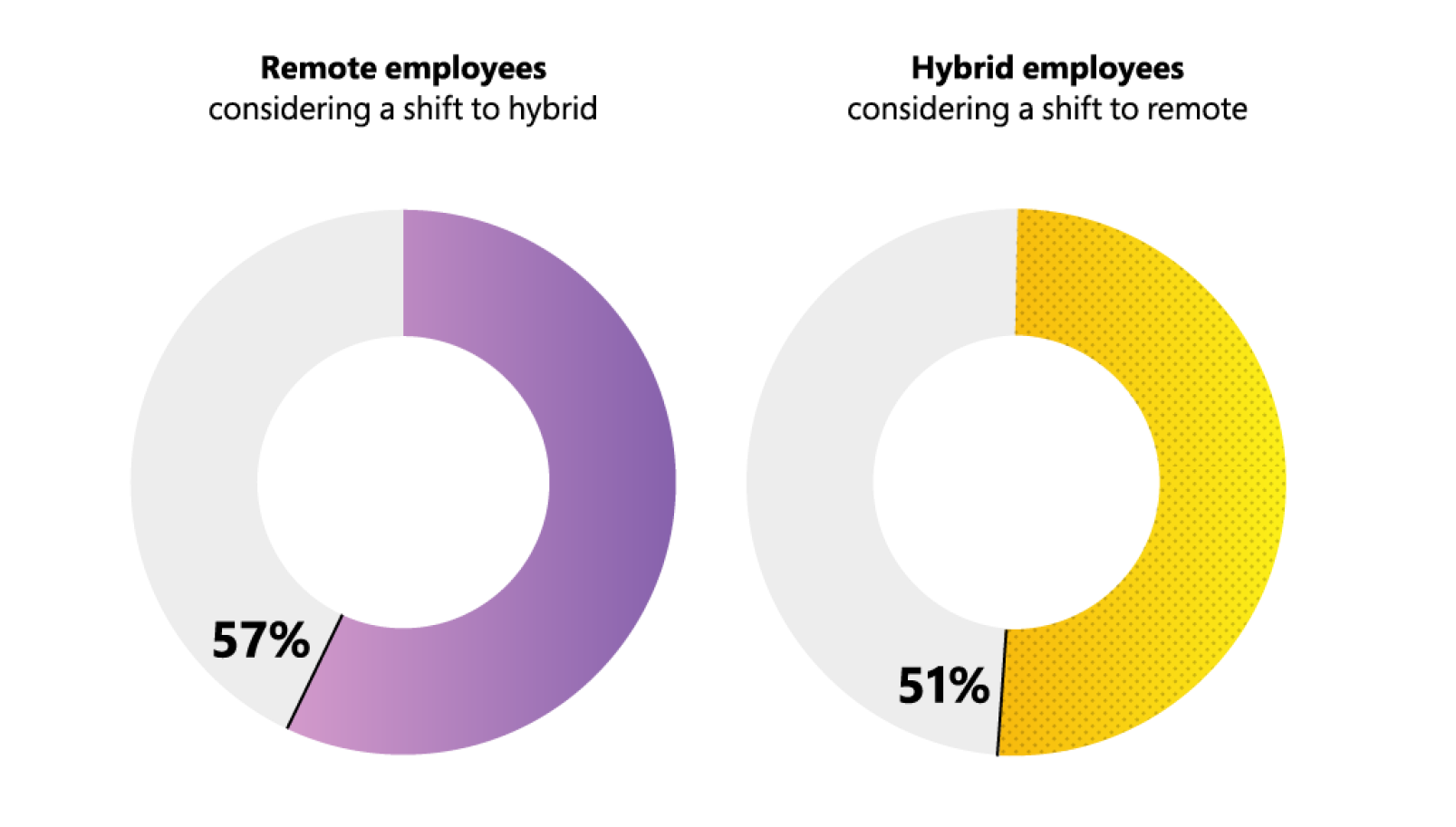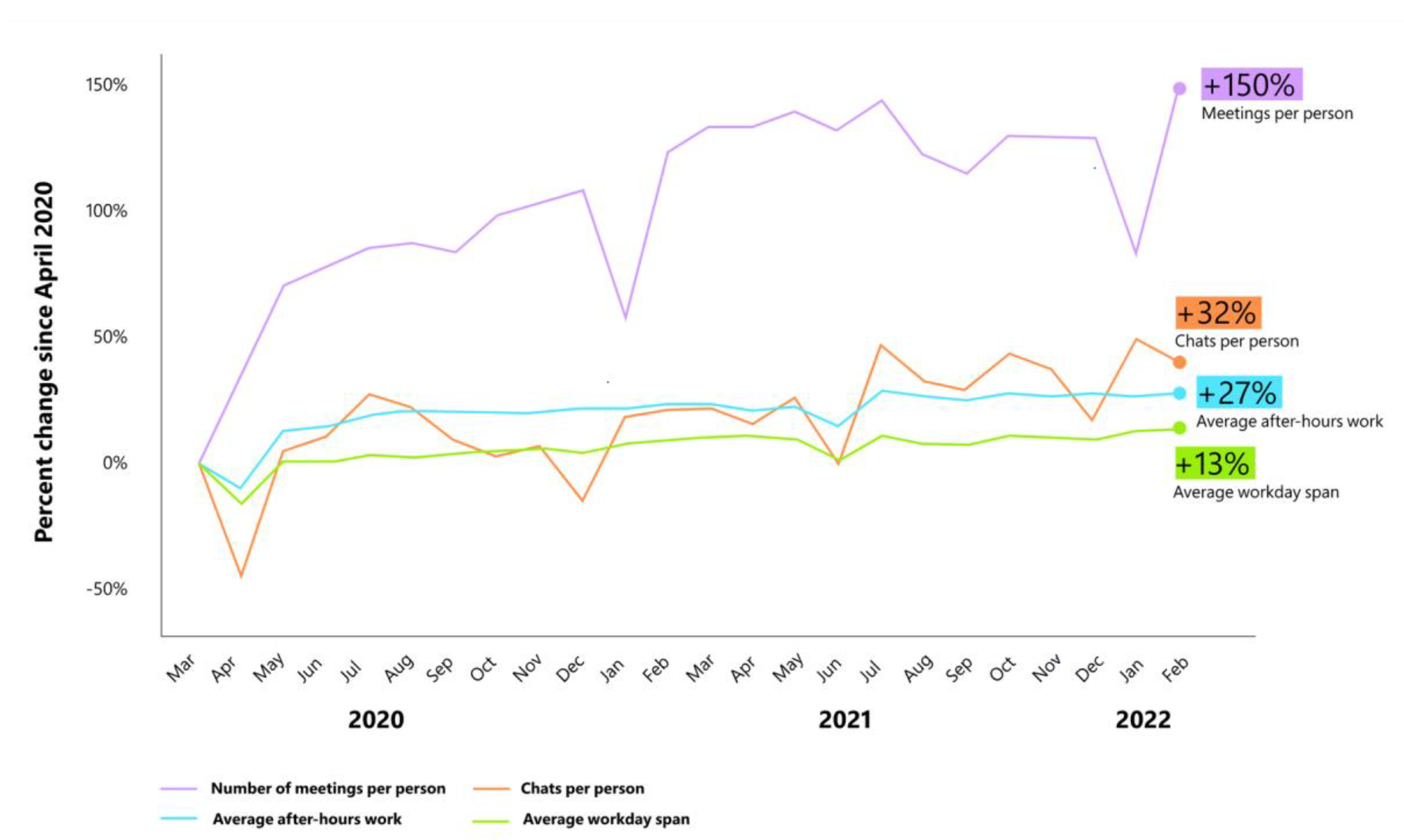Organisations that continue to support flexible working will be the ones to win the war on talent

UK workers and their bosses are reaping the benefits of flexible working, according to new research released by @Microsoft.
According to Microsoft’s latest Work Trend Index, the number of people working in a hybrid way across the world is up seven percentage points on last year at (38%), while 53% of people are likely to consider transitioning to hybrid working in the year ahead.
When UK staff were surveyed, 84% said they are as productive or even more productive compared to a year ago – higher than the global average of 81%. The UK figure is higher than Australia, Japan, Canada and many countries across Europe.
Less than half (43%) of business leaders in the UK who were surveyed said productivity had been negatively impacted since the move to remote or hybrid working. This is 11 percentage points lower than the global average, and much lower than the 84% recorded in China, 62% in India, 53% in Italy and 52% in France.
Darren Hockley, Managing Director at DeltaNet International, said:
“Microsoft’s latest Work Trend Index just further highlights those employees working flexibly are productive, and those organisations that will continue to support flexible working either with remote or hybrid practices will be the ones to win the war on talent.
“Unfortunately, the research found that 44% of business leaders in the UK say their company is planning to require employees to work in-person, full-time within the next year – this is a contrast to the 53% of people who are likely to consider transitioning to hybrid working in the year ahead. The pandemic has given employees significant reflection time about what they want in their careers. Employees prioritise work-life balance and wellbeing, and organisations that don’t recognise the need to support employees’ priorities will lead to significant skills gaps. Treating employees with the respect they deserve and empowering them to thrive in the environment that suits them best will be pivotal to securing and retaining the best talent.”
The UK is showing the world that flexible working can be a success
While many organisations in countries across the world are struggling to adapt to new ways of working that will see employees split their time between the office and their home, the UK is showing them how it should be done.
Organisations in the UK are seeing that productivity is not being affected by where their staff work. As a result, they are giving employees more say in deciding whether they commute to the office or work from home. Less than half (44%) of business leaders in the UK say their company is planning to require employees to work in-person, full-time within the next year. This is six percentage points lower than the global average.
UK staff appear to be in lockstep with their managers and like the freedom to choose how and where they work. Only 38% of workers in the UK who are currently working in a hybrid workplace will seek to be fully remote in the next year, compared with a global average of 51%.
Nick Hedderman, Senior Director of Modern Work Business Group, said:
“Microsoft’s latest Work Trend Index shows the UK has not only adapted to flexible working but is embracing it – and reaping the benefits. This is encouraging as the UK rethinks how to be competitive on the global stage. Organisations will be able to attract and retain the very best talent from the hyper-competitive job market with this progressive thinking. The role of leaders has never been so critical in this change, as every person and team will have preferences. It’s critical leaders have open and honest discussions with each employee and the team as a whole about what flexible work means for them to maximise their impact and nurture their wellbeing.”
It’s important that managers schedule regular conversations with employees; model, coach and care; be clear with their teams on the hybrid working strategy and ensure every meeting can be attended in person and online using tools such as Microsoft Teams.
For individuals, one of the most important considerations of remote and hybrid work is the impact it has had on relationships with colleagues. Last year’s Work Trend Index revealed that teams became more siloed. However, this year the UK has bucked the trend again. Only 37% of business leaders in the UK say relationship-building activities are the greatest challenge of having employees work remotely or in a hybrid way, compared with a global average of 43%.
Hybrid workers in the UK are also less likely than the global average to feel lonely and are less likely to have seen working relationships suffer while working remotely.
Microsoft’s 2022 Work Trend Index reveals findings from a study of 31,000 people in 31 countries, along with an analysis of trillions of productivity signals in Microsoft 365 and labour trends on LinkedIn.
The pandemic has led to a 153% rise in the number of weekly meetings and a 252% increase in weekly time spent in meetings for the average Teams user since February 2020. There has also been a 32% increase in chats sent per person since April 2020.
As a result, an average Teams user has seen their workday increase more than 13% (46 minutes) since March 2020, and after-hours and weekend work has grown even more quickly, at 28% and 14%, respectively.
With so much demand for people’s working time, employees are now more likely to prioritize their health and wellbeing over work than before the COVID-19 pandemic. Eighteen percent of staff changed jobs last year, with personal wellbeing or mental health and work-life balance cited as the top reasons. Forty-six percent say they are looking for a positive work culture, while 42% said they wanted mental health and wellbeing benefits.
7 Reasons Why Your Company Should Adopt Flexible Working
23 Dec 2021: The success of a business is largely dependent on the input from the staff. Members of staff will naturally put in their best when there is a conducive work environment. As a manager, creating an enabling work environment is more than just ensuring a comfortable physical space. You have to aim to strengthen office ties not just among the employees but between the manager and employees. Adopting flexible work habits for your staff is the right step in that direction. The sole focus should be that each member of staff delivers on assigned duties.
Making work flexible in the office is all about adapting a plan that suits your employees’ needs. A lazy employee’s ineptitude may not necessarily be a consequence of not showing up for work on time or closing earlier than usual. It is possible for your staff to achieve more in an hour than another staff would throughout the day. It is all about attitude to work. In such cases, you can consider the option of tracking time to see how much time it takes for a task to be done. You can make working hours flexible for your staff and they will still deliver on the job. Remote working or working from home is one way of making working habits flexible.
1. Cost Savings
It is unwise to rent an office space for the whole day when for most of the working hours, your employees are either visiting customers or working from home. You can save costs as a business owner by practicing hot-desking. This will save the business or company some money on desks, office equipment, and rent as you will only be paying for seats and office equipment used instead of the whole office space. The employee also gets to save costs too through a reduction in transportation costs. They also do not have to buy too many official wears since they will be working from home some of the time.
2. Equality and Diversity
One of the reasons companies embrace the flexibility of working hours is to give some smart individuals who may not have the 9 to 5 working hours resilience to be inclusive. Some employees prefer to work from their homes because their kids are still young and they want to be able to monitor them. There could also be disabled but smart individuals who cannot afford to journey every day just to be within the office environment. These people can also deliver their jobs well from their homes. The reason your company should adopt flexible working is to create a culture of inclusion, equality, and diversity.
3. The technology for flexible working is available
To get your work done most times, you just need a computer system, regular internet, and some other office equipment. These are things you can also have at home. Instead of computer desktops, replace them with laptops so they can easily be carried around. So, there is no reason not to make work flexible.
4. It improves retention
One of the best perks you can give to your employees is to allow for work flexibility. It gives your staff opportunities to express their working habits freely. This is a good move for your company if you hope to retain your veteran employees as most workers will stay with or opt for jobs that offer flexible working. Many companies have started to even hire agencies that provide payroll outsourcing as an efficient way to pay their employers when working remotely.
5. The changing work-world
The coronavirus pandemic forced most companies to adapt to flexible working. As a result, so many workers started working from home with only skeletal office activities going on. Remote working had been happening even before the pandemic but it was on the low. Now, some companies have even permanently adopted the work-from-home option. As a company hoping to measure up to your competitors or overtake them, you have to flow with the trends. Otherwise, you will lose your important staff to your competitors just because of your rigid office rules. To see how working from an office solely is not the best thing at the moment we should look at events that are happening globally. So you might be organizing an event in your country while the participants are joining from different parts of the world. Of course, there are tools and platforms you can use to make the process easier such as the platforms for remote simultaneous interpreting, but this is just to show that you can do so much more and work better without the need to be in the same place, in the same office.
6. Improves Employee Engagement
One of the ways to show your employees that you trust them to deliver top-class jobs is by allowing them the option of flexible working. Engaging an employee is making them understand their roles and what they need to do to contribute to the company’s success. This improves when you trust them to go about it using their preferred working style.
7. Work-life balance
Adopting flexible working for your employees is a straightforward way to improve work-life balance. Having to go to work every day and staying away from your family for at least nine hours keeps you away from some of your home duties especially if you are married with kids. When you have a flexible working style, it will help you make out time for some other aspects of your life that are lacking attention. This way, you will be able to improve your work-life balance.
Conclusion
There are so many reasons why companies adopt flexible working and frankly speaking, the coronavirus pandemic has forced more business organizations to adopt this style. If you own a company, you should consider giving this option to your staff because chances are that almost all your competitors are doing this already. If they are boosting the morale of their own staff with this measure, then they will definitely be more productive than your company. After all, the staff determines the company’s productivity.














Responses